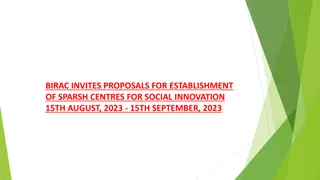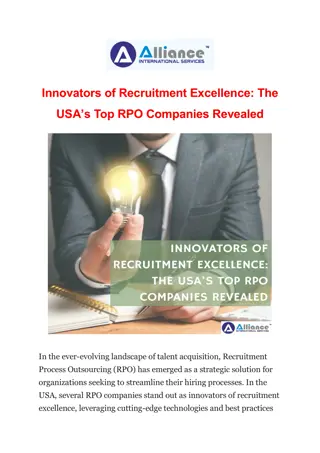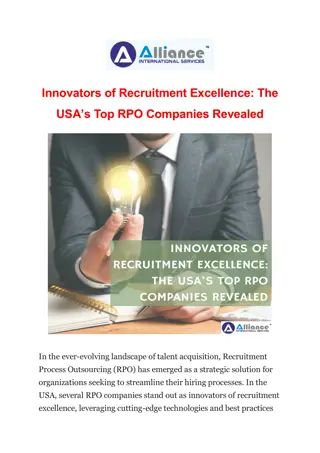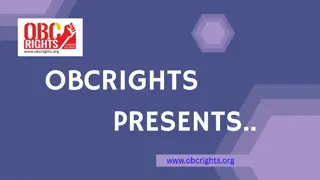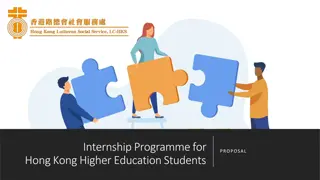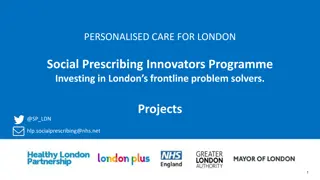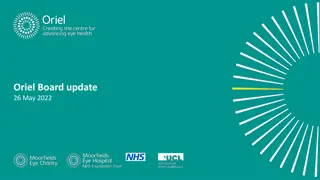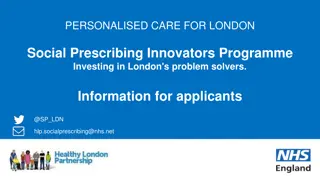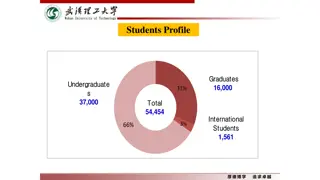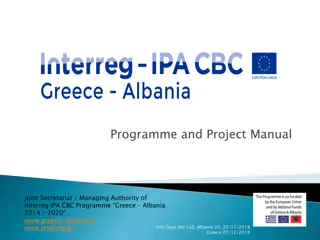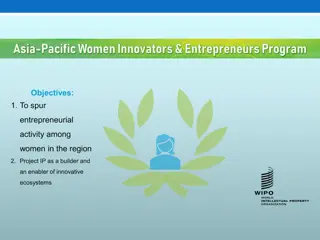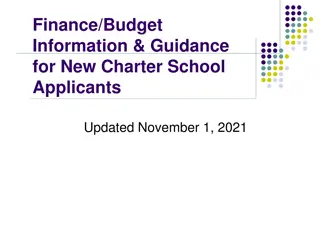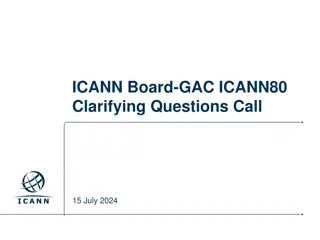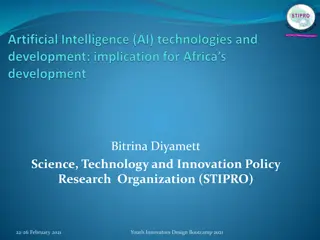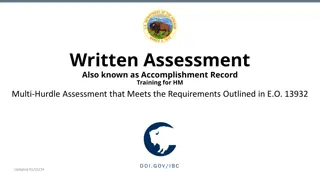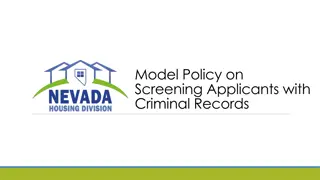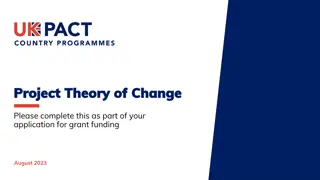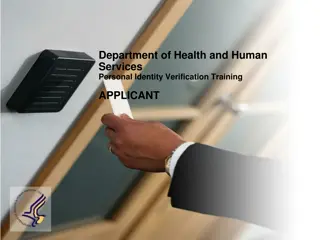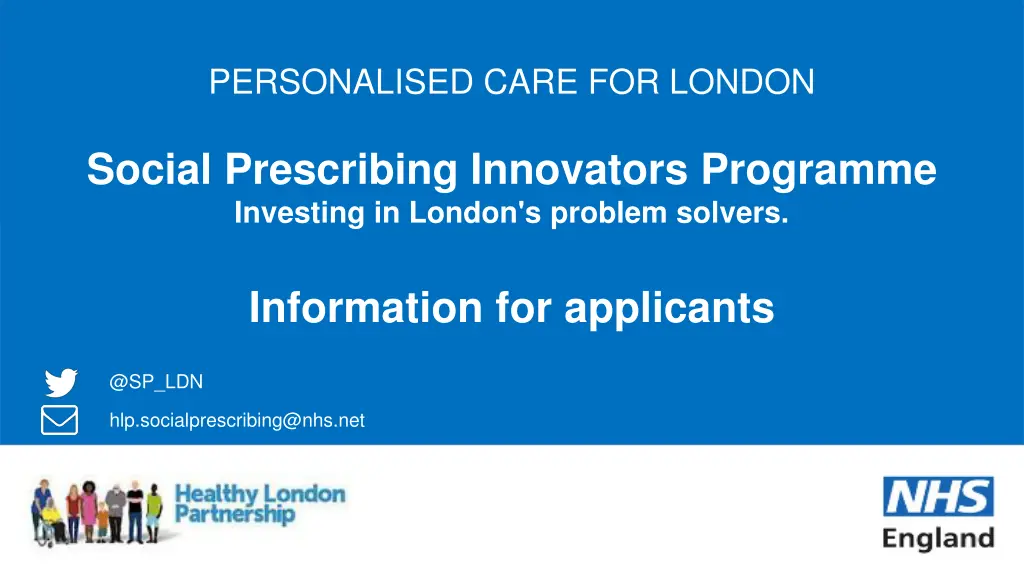
Innovators Programme for London's Social Prescribing
"Join the Personalised Care for London Social Prescribing Innovators Programme to support social prescribing services in tackling challenges and reducing health inequalities. Get involved in innovative solutions for London's health and well-being. Apply now for funding and support."
Download Presentation

Please find below an Image/Link to download the presentation.
The content on the website is provided AS IS for your information and personal use only. It may not be sold, licensed, or shared on other websites without obtaining consent from the author. If you encounter any issues during the download, it is possible that the publisher has removed the file from their server.
You are allowed to download the files provided on this website for personal or commercial use, subject to the condition that they are used lawfully. All files are the property of their respective owners.
The content on the website is provided AS IS for your information and personal use only. It may not be sold, licensed, or shared on other websites without obtaining consent from the author.
E N D
Presentation Transcript
PERSONALISED CARE FOR LONDON Social Prescribing Innovators Programme Investing in London's problem solvers. Information for applicants @SP_LDN hlp.socialprescribing@nhs.net 1
Who we are? Personalised Care Health Inequalities and Inclusion Our vision is for all Londoners to be more actively involved in their health and wellbeing and make decisions based on what matters to them and what they really need. Personalised care means people have choice and control over the way their care is planned and delivered. Our role in personalised care We provide leadership and support to the London system; including NHS England, Integrated Care Systems (ICS) and Primary Care Networks (PCN) to help spread and scale personalised care. We also lead the London Social Prescribing partnership and improvement collaborative, connecting system partners including health, social care, public health, VCSE, Greater London Authority (GLA) and other partners across London to facilitate cross sector collaboration. Our focus is on the spread, scale-up and sustainability of Social Prescribing in London by: Supporting the workforce through recruitment and retention initiatives Supporting ICSs and PCNs to develop Social Prescribing Strategies Driving innovation in Social Prescribing Communicating the benefits and the impact of Social Prescribing 2
What is it? Social Prescribing Innovators Programme The Social Prescribing Innovators Programme aims to support Social Prescribing services and individual Social Prescribing Link Workers across London to mitigate challenges they face in delivering social prescribing in primary care by testing and sharing innovative ways of working. This is a pilot fund with a 6 month project lifecycle from Oct 22- Mar 23. A programme of support and an award of up to 10k can be granted to each successful applicant/team, which may include social prescribing services, PCNs, VCSE sector organisations, Local Authorities, charity organisations or GP Federation partners. Funding will be used to support an individual or small team to innovate a solution to their chosen challenge(s), this could involve: Implementing a Social Prescribing service design change Carrying out a local pilot to test solutions to systemic challenges in embedding social prescribing successfully into the health service Develop solutions to specific priorities within the NHS, following the COVID pandemic, including tackling inequalities Projects for this fund will begin in September/October 2022. Target impact of the overall programme: Empower social prescribing services to tackle some of the universal challenges to deliver impactful and sustainable embedded services Reduce health inequalities Support the creation of new approaches that can be scaled Make the case for Social Prescribing and its benefit on NHS services 3
Theory of Change & Impact Inputs Activities Outputs Outcomes Impact 12 projects tackling challenges to effective Social Prescribing Case studies of the approach tested Development of resources that will be useful across the system A toolkit to share with ICSs to run similar programs focused on improvement Social Prescribing better embedded and more sustainable Support Social Prescribing services to provide an impactful service to London's most disadvantaged commun ities, reducing health inequalities Collective of leaders improving Social Prescribing who can demonstrate its impact 10k grants to be awarded to local Social Prescribing services with chosen challenge Programme of support (including 1:1 coaching, project and developmental support) to take a continuous improvement approach to achieve meaningful change Local Social Prescribing services to test new approaches to old/systemic challenges Community of practice created for change makers participating Ad-hoc support and connection building where most needed for each project to support success Better insights into challenges embedding Social Prescribing in PCNs Examples of innovative work to share with other Social Prescribing services System empowered to innovate and develop meaningful solutions A process to enable meaningful bottom-up change on the frontline 4
Programme Offer and Support Successful applicants will benefit from a 6-month programme of support to help deliver projects against their specified challenge . This will include: 4x monthly Quality Improvement training sessions project lead and deputy only (half day) 3x Bi-monthly skills share to support you as a changemaker for all project participants (1.5 hours) 3x Bi-monthly Peer Consulting Group with your programme peers project leads only (2 hours) 3x Bi-monthly 1:1 coaching sessions to develop your leadership in improvement project leads only (45 min) Fortnightly drop-in support sessions optional ad-hoc support all project participants (1.5 hours) Additional support provided: Cohort Whatsapp group Networking opportunities with cohort as well as wider partners Access to ad hoc support through partners (decision making board) for specialised topics e.g. digital Potential to access further Quality Improvement training or more specialised skills training Opportunity to innovate and explore new ways of working This programme is a pilot but the wider strategic vision is to scale this approach with additional funding. We plan to share learnings with other social prescribing services and embed this innovation programme approach into ICSs. 5
Project Guidance What would an ideal project look like for the innovation fund? Applicants should choose a challenge that impacts their social prescribing service being able to: Have a sustainable workforce Run effectively and efficiently Tackle health inequalities Reduce pressure on other NHS services In the application you will be asked for some suggested solutions to your chosen challenge. There is ringfenced funding specifically for projects related to recruitment and retention. With this in mind, we will prioritise applications looking at challenges to this as well as those in two other priority areas: Access and Impact. Challenge theme Example challenges Recruitment and retention Lack of progression in the SP service leading to well embedded SPLWs moving onto other roles Lack of access and uptake of social prescribing among specific cohorts of people e.g. refugee populations Access social prescribing reaching the right people Lack of collection of data to inform around who is likely to benefit most from SP Impact demonstrating the benefit of social prescribing 6
Project Guidance What would an ideal applicant look like for the programme? Service improvement is most successful when delivered as a small team. We d encourage applications from small groups with one lead, or from individuals who have at least one colleague who will be supporting with the project activities. For example, applicants may be: Those working in a PCN or GP practice (Social prescribing link workers, GPs or PCN Managers) A group of SPLW working in a VCSE organisation e.g. Age UK Service Managers Training hubs Those working closely with Social Prescribing within an ICS/CCG 7
Application Guidance Successful applicants will need to demonstrate the following in their application: 1. A clear understanding of the challenge(s) to social prescribing: a) How it creates a barrier for social prescribing to thrive b) How the challenge(s) may be widespread 2. A broad understanding of the existing solutions: a) How they are insufficient 3. Creative and strategic thinking in suggested alternative solutions a) Goals/outcomes of suggested solutions that are appropriate, feasible and achievable b) Project planning, deliverables and risks 4. A good idea of the people, partners and resources required to enable this work and why a) How you plan to engage them 5. A strong understanding of coproduction and how to apply it 6. How overcoming the challenge(s) will have a positive impact, in particular on: a) Tackling health inequalities b) PCN work 7. A clear understanding of and ability to carry out evaluation, specifically in terms of: a) How to measure impact b) Data collection and analysis 8. That you have considered how the learnings from this programme could be shared and a willingness to scale solutions 9. An understanding of the current priorities within the NHS and how the solution can support 8
Application Process Key criteria There is an online application process, launching 22nd June. The application form can be found here. If you have any accessibility requirements, we are keen to support, please get in touch: hlp.socialprescribing@nhs.net The deadline for submitting is 12 midnight on Wednesday 20th July 2022 Expectations Part of an organisation that is based in London - please note, we will be looking for a geographical spread of projects across London. Projects should focus on solutions to support Social Prescribing service design - not funding voluntary/community sector activities which individuals are referred to. The Innovators Programme is an opportunity to lead a 6-month pilot project between September 2022 and February 2023 and participants will be expected to share outcomes and learnings publicly. Participants must be willing to publicly share outcomes and learnings at the end of their project - even if key deliverables are not achieved. The application deadline is midnight on the 20th July 2022. Projects and programme support will commence in September 2022 and will run until February 2023. Participants need to be able to commence projects and programme support at the beginning of September 2022 and have capacity to commit to the 6 month programme. Must have a direct link to Social Prescribing. Attend all mandatory sessions. 9
Application Process How to apply? There is an online application process. The application form can be found here (launch from 22ndJune). The deadline for submitting is 12 midnight on Wednesday 20th July 2022 If your application is successful, you will be shortlisted and may be invited to a follow-up conversation to talk about your project idea in more detail. A board of decision members will help us award places on the programme to successful applicants. Key things to consider before applying: 1. What the most pressing challenges to your social prescribing service are 2. What good would like when solving your chosen challenge 3. What support you would need to successfully innovate against your chosen challenge 4. What capacity you or your team might need to be a part of this programme 5. What senior buy in or stakeholders you might need on board to successfully innovate against your chosen challenge 6. What you will spend your budget on (guidance on next slide) 10
Application Guidance What can you spend the money on? Funding can go towards Staff salaries Funding can't go towards Voluntary/community sector activities alone Activities that replace government funding Political activities Retrospective costs Loan repayments Any activities that generate profits for private gain Equipment Organisational development and training Small-scale refurbishment Any running costs Project activities 11
Application process: The decision making board We have a collective of leaders who will support us throughout the project lifecycle to: 1. Help us decide who to award funds to 2. Share feedback on the programme and processes of the Innovation Fund, to inform the Pilot, as well as the refined 23/24 fund 3. Champion your areas of expertise by supporting successful applicants, connecting them with people in your network that might be able to support 4. Help us promote the programme to those in their network Name Role Organisation Specialty areas Zlatina Nikolova SPLW, SP Advocate Age UK Islington Social prescribing, VCSE OneWestminster Kateryn Florez SPLW Social prescribing, VCSE, Psychology Nirja Joshi GP, Fellow, SWL Long Covid Education Champion Wandsworth Training Hub Social prescribing improvement, Long COVID, Clinical, Primary Care Liz Ayres Lead Transformation Programme Manager (Kingston and Richmond) SWL CCG Transformation, Commissioning, Health Inequalities, ARRS Suzi Griffiths Project manager Healthy London Partnership CYP, Social Prescribing, Local Authority Devika Vadher Senior Manager - Personalised care London NHSEI London Region Personalised Care, NHS, Digital Social Prescribing, Public health, Primary care, Dental Stephanie McKinley London Social Prescribing Network Manager LondonPlus VCSE, Green SP, Thriving Communities, Partnerships, Physical activity SP, Cost of Living crisis Anthony Atherton Part of Regional strategic coproduction group NHSEI Coproduction Dan Hopewell Director of Innovation Bromley By Bow Centre Innovation, Data and evaluation, Social Prescribing, Service design, Research, Population Health, Health Creation and communities Jagan John GP (Aurora Medcare) GPWSI in Cardiology ( BDCHS) Personalised Care Clinical Lead Clinical Chair Barking &Dagenham Chair NEL CCG NEL ICS ICS, Clinical, Social Prescribing, Leadership, Primary Care, Cardiology Thomas Kador Lecturer in Creative Health, researcher, lead for Creative Health MASc University College London Academic, research, ARRS, Social Prescribing, Evaluation, Creative health, Health inequalities, mental health, wellbeing 12
Application Process How to cost up your idea? Coming to the programme with a challenge rather than a fully agreed solution makes it more difficult to cost up the project. The steps below will help you consider how much you could need. 1. Brainstorm some of the possible solutions to your challenge 2. Do any of these solutions require buying something? E.g. an information system, space 3. Do any of these solutions involve bringing in a specific role? E.g. a community development worker for 3 months 4. What capacity of the team members is required to develop the solutions? Could you cost this? 5. Do you need extra project management support? Could you cost this? 6. Is there any additional expertise you might need for the process or solution? E.g. costs for a data analyst or graphic designer Example costs: Staff costs: e.g. A SPLW for 3 months = 7.5k Evaluation support: e.g. Data analysis and evaluation support = 2k Comms output: e.g. Video production cost = 500 - 1.5k 13
Pre programme timeline Dates for your diary (pre-programme) Activity Social Prescribing Innovation Fund launch publish guidance and application form Application workshop and Q&A Timeframe (date and time where applicable) Wednesday 22nd June 2022 12 noon Thursday 7th July 2022 9-11am Release of application workshop recording Friday 8th July 2022 Deadline for applications Wednesday 20th July 2022 12 midnight Clarification period Monday 25th Friday 29th July 2022 Outcome of applications communicated Week commencing 8th August 2022 Deadline to accept offer of programme place and confirm programme team names Monday 15th August 2022 12 midnight 14
Programme timetable Standard training (mandatory) Peer support Project support Development support Month 1. Pre-programme kick-off meeting (2hr) Skills share ( 2 hour)/ Peer consulting Sep 1. Quality Improvement Session 1: Scoping and planning TBC (half day) 1. Monthly HLP led peer support drop ins Oct 1. Quality Improvement Session 2: Implementing change TBC (half day) 1. Monthly HLP led peer support drop ins (same day as skills share) 1. Board check-in and support and feedback . 1:1 45 min coaching session Nov 1. Quality Improvement Session 3: Tracking progress and refining TBC (half day) 1. Monthly HLP led peer support drop ins Skills share ( 2 hour)/ Peer consulting Dec 1. Quality Improvement session 4: Measuring success and evaluation TBC (half day) 1. Monthly HLP led peer support drop ins (same day as skills share) 1. Board check-in and support and feedback 2. 1:1 45 min coaching session Jan 1. Monthly HLP led peer support drop ins Skills share ( 2 hour)/ Peer consulting Feb 1. Monthly HLP led peer support drop ins (same day as skills share) 1. Board check-in and support and feedback 1:1 45 min coaching session Mar Programme graduation: Sharing success celebration present results and forward plan w/c 27 March 22 Mar 15 All peer, project and development support sessions will be recorded for those unable to attend. Underlined sessions are mandatory to attend
Quality Improvement (QI) Quality Improvement is a structured way to try out different solutions to a chosen challenge. The training delivered as part of this programme will encourage you to understand the problem, develop innovative ideas for change, test solutions and evaluate. Why take a QI approach? Helps you pick clear goals for what success looks like It is flexible, allowing for approaches to be changed if something isn t working Helps you keep on track as progress is continuously monitored Structured enough so you always know what the next step is Encourages use of data in a meaningful way, not boring reporting The skills can be used when trying to improve anything It has been used successfully throughout the NHS to improve services for both staff and patients Key questions/things to consider: What does success look like? What are we trying to achieve? How will we know that a change is an improvement? What change can we make that will result in improvement? Permission to fail as well as to succeed! 16
Helpful Resources Co-production: Model of Co-production NASP: Co-Production and Social Prescribing Co-Production Collective Learning & Resources Digital: HSSF support framework QI: Quality Improvement Overview - linked under 'more information' on the HLP website Health inequalities: NASP: The role of social prescribing in addressing health inequalities Personalised Care DES spec Health inequalities DES spec 17

